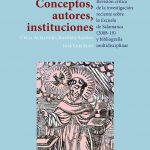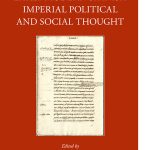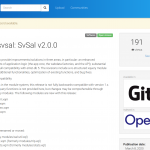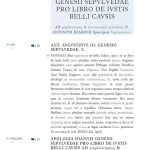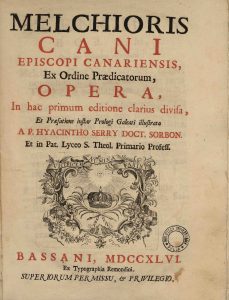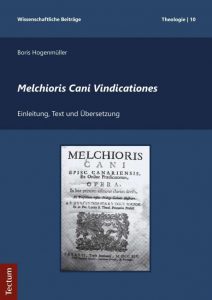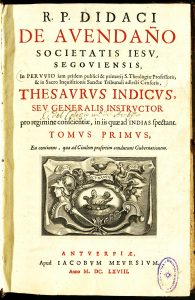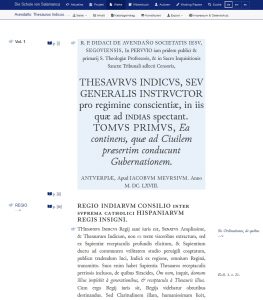Last April, Conceptos, autores, instituciones, authored by Alejandra Ramírez Santos and José Luis Egío was published by Dykinson Editors in Madrid. The book offers a panorama on the research on the School of Salamanca carried out in the last decade. In this period a great renewal of research methods took place, together with the growing interest of various disciplines in Salamanca’s scholasticism, its internationalization as a field of study and the launching of various research projects and initiatives of publication of important scholastic sources aimed at broadening previous research perspectives, until recently very focused on the study of natural law, the law of nations and some theological and metaphysical themes. Ramírez’s and Egío’s critical review of the recent research on the School of Salamanca takes its main conclusions from a wide bibliography of 2.176 academic writings having being published between 2008 and 2019. These writings are ordered according to an exhaustive list of thematic descriptors, which make it easy to locate the publications dedicated to a certain author of the School of Salamanca, concept, research topic or institution (mendicant orders, Universities, …). „(English) Book publication: Conceptos, autores, instituciones. Revisión crítica de la investigación reciente sobre la Escuela de Salamanca (2008-19) y bibliografía multidisciplinar“ weiterlesen
(English) The School of Salamanca: New Digital Editions of Nebrija’s “Lexicon Iuris Civilis” and Diego de Avendaño’s “Thesaurus Indicus”, vol. 3, now online
In March and April, two new important sources of the Digital Collection of Sources of the School of Salamanca were published:
The Lexicon Iuris Civilis, written by Nebrija in 1506, has been edited according to the printed version of Frellaeus (Lyon, 1537). Part of a big encyclopaedical project undertook by Nebrija to offer the learned community of his time systematic vocabularies of disciplines such as medicine, natural history, theology and law, Nebrija’s Lexicon Iuris Civilis integrated 600 lemmata. „(English) The School of Salamanca: New Digital Editions of Nebrija’s “Lexicon Iuris Civilis” and Diego de Avendaño’s “Thesaurus Indicus”, vol. 3, now online“ weiterlesen
(English) Before Vitoria. Birr’s and Egío’s Contribution to the Brill Companion to Early Modern Spanish Imperial Political and Social Thought
Christiane Birr and José Luis Egío’s chapter in the recently published Companion to Early Modern Spanish Imperial Political and Social Thought focusses on a number of 15th-century writings by the jurist Alfonso de Cartagena and the theologian Bernardino López de Carvajal, both of whom were very active in Castilian diplomatic circles. While Francisco de Vitoria is often seen as having played the pioneering role in identifying the new historical dilemmas entailed by the ‘discovery’ of new, pagan peoples in the Americas, the ideas underlying these issues can only be understood in their full complexity if we look back into the 15th century. „(English) Before Vitoria. Birr’s and Egío’s Contribution to the Brill Companion to Early Modern Spanish Imperial Political and Social Thought“ weiterlesen
Entwicklung der Webanwendung (v2.0)
Ein Bericht von David Glück und Andreas Wagner
Am 1. März 2018 wurde die Version 1.0 der Webanwendung im Rahmen eines Beitrags von Andreas Wagner und David Glück bei der Konferenz „Digital Humanities im deutschsprachigen Raum 2018“ als freie Software veröffentlicht und der wissenschaftlichen Community zur Verfügung gestellt. Seitdem wird die Webanwendung in Open Source und mit einem laufenden Versionierungsmodell weiterentwickelt. Sowohl die Webanwendung als Ganze als auch die einzelnen Releases der Anwendung sind seitdem nachhaltig archiviert und über DOIs zitierbar.1 Ebenfalls 2018 wurde die auf der Webanwendung aufbauende Digitale Quellensammlung des Projekts erstmals einem fachwissenschaftlichen Publikum präsentiert und (in Verbindung mit der Publikation von Francisco de Vitorias Confessionario, des ersten Textes der Digitalen Quellensammlung) als Forschungsplattform veröffentlicht. Im März 2020 haben wir die Version 2.0 der Webanwendung veröffentlicht. Im Folgenden wollen wir einen Überblick über die wichtigsten Entwicklungen seit der erstmaligen Veröffentlichung geben. „Entwicklung der Webanwendung (v2.0)“ weiterlesen
Die Schule von Salamanca: Neue digitale Edition von Juan Ginés de Sepúlvedas „Apologia“ jetzt online
Nach Bartolomé de las Casas ist nun auch sein Widersacher in der Debatte von Valladolid, der Humanist und Historiker Karls V., Juan Ginés de Sepúlveda, in der digitalen Quellensammlung vertreten: mit seiner „Apología pro libro de iustis belli causis“ (1552). „Die Schule von Salamanca: Neue digitale Edition von Juan Ginés de Sepúlvedas „Apologia“ jetzt online“ weiterlesen
(English) Juan Belda Plans: Presentación de la edición crítica y la traducción al español de la Relectio de Poenitentia de Melchor Cano
Date: 5.02.2020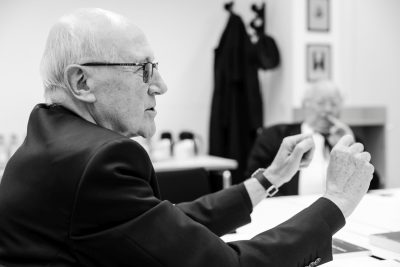
Time: 14:30 – 16:00
Speaker: Juan Belda Plans (Valencia)
Organisation: Christiane Birr, José Luis Egío
Place: MPIeR
Room: Z01
After the introduction to his editing and translation project in March 2019 [https://blog.salamanca.school/de/2019/03/11/salamanca-kolloquium-observaciones-sobre-edicion-critica-de-melchor-cano-metodos-y-subsidios-para-el-trabajo/], Juan Belda Plans will be once again a guest at the Salamanca Colloquium. This time he presents the results of his work in Frankfurt: the completed critical edition of the Relectio de Poenitentia (1549) by Melchor Cano, published in 2020, with Spanish translation.
The Colloquium will be held in Spanish.
(English) Boris Hogenmüller: Melchor Cano, De locis theologicis – some remarks on concept and reception of the Loci
Date: 15.01.2020
Time: 14:30 – 16:00
Speaker: Boris Hogenmüller (Würzburg)
Organisation: Christiane Birr, José Luis Egío
Place: MPIeR
Room: Z01
With his extensive and complex major work De locis theologicis, Melchor Cano layed the foundations of modern dogmatics in theology. A German translation of this work was carfried out from 2006 to 20014 in the DFG project „Melchior Cano De locis theologicis. Critical Edition of the Latin Text and German Translation“ by Elmar Klinger, Thomas Franz and Boris Hogenmüller. Subsequently, Hogenmüller edited and translated the Melchiori Cani Vindicationes by the French Dominican François-Jacques-Hyacinthe Serry, published in 1714, with which Serry defended Cano and the Loci against various theological-literary attacks. In the colloquium Boris Hogenmüller will talk about Cano, his work and its reception in the early modern period and thus give an insight into the highly intense theological-scientific discussions of the 16th and 17th centuries.
The Colloquium will be held in English.
(English) Bruna Franceschini: Reflections on the Legal Subject in the Context of Latin American Colonialism
Date: 11.12.2019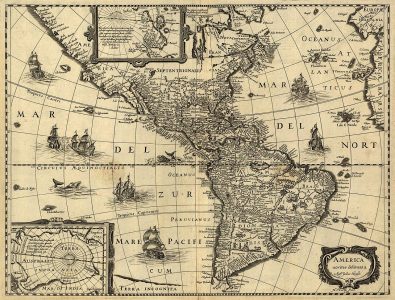
Time: 14:30 – 16:00
Speaker: Bruna Franceschini (Coimbra)
Organisation: Christiane Birr, José Luis Egío
Place: MPIeR
Room: Z01
Bruna Franceschini will talk about her doctoral research project that aims to investigate some roots of the formation of the notion of subject of Law in the context of Latin American colonialism, mainly in Brazilian context. In fact, the work is an attempt to associate the contributions of Legal History to reflections of Philosophy of Law concerning the recognition of the other for the construction of legal intersubjectivity.
The Colloquium will be held in English.
Arbeitsgespräch „Translating Melchor Cano“
Datum: 11.10.2019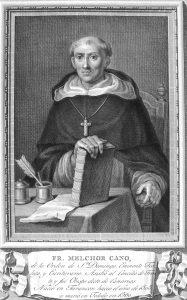
Uhrzeit: 11:00 – 13:00
Teilnehmer: Juan Belda Plans (Valencia), Elmar Klinger (Würzburg/Herzogenaurach), Boris Hogenmüller (Würzburg), Thomas Franz (Würzburg)
Organisation: Christiane Birr (MPIeR)
Ort: MPIeR
Raum: Z02
Melchor Cano (1509-1560) gehört zu den bedeutendsten Autoren der Schule von Salamanca: Bereits mit fünfzehn Jahren trat er als Schüler Francisco de Vitorias in Salamanca in den Dominikaner-Orden ein. Mit fünfundzwanzig erhielt er seinen ersten theologischen Lehrstuhl in Valladolid; nach dem Tod seines akademischen Lehrers Vitoria 1546 übernahm er dessen renommierten Lehrstuhl in Salamanca selbst. Sein Hauptwerk, De locis theologicis, 1563 posthum in Salamanca erschienen, ist das Grundlagenwerk theologischer Erkenntnislehre der Neuzeit und stellt das erste Gesamtprogramm katholischer Dogmatik als eigenständiger Disziplin dar.
Eine spanische Übersetzung dieses ebenso zentralen wie komplexen Werks der neuzeitlichen Theologie legte Juan Belda Plans 2006 vor; Elmar Klinger, Thomas Franz und Boris Hogenmüller erarbeiteten eine deutsche Übersetzung, deren Publikation noch aussteht. In dem Arbeitsgespräch wird es um die besonderen Anforderungen an die Interpretation und Übersetzung theologischer Texte der Schule von Salamanca gehen, um die Spezifika frühneuzeitlichen Lateins und den Stellenwert von Übersetzungen in der modernen Rezeption der Schule von Salamanca.
Diskussionssprachen sind Spanisch und Deutsch.
Die Schule von Salamanca: Neue digitale Edition von Diego de Avendaños „Thesaurus Indicus, Vol. 1“ jetzt online
Diego de Avendaño (1594-1688) wurde in Segovia geboren. Während seiner Studienzeit in Sevilla lernte er Juan de Solórzano Pereira kennen und begleitete ihn noch vor seinem zwanzigsten Geburtstag in die Neue Welt. Avendaño setzte seine Studien in Lima am Colegio San Martín der Jesuiten fort, trat selbst in den Orden ein und unterrichtete und leitete in den folgenden Jahrzehnten die Kollegien und Ordensuniversitäten in Cuzco, Charcas und Lima. Nach, wie er selbst sagte, „beinahe fünfzig Jahren in Peru“ veröffentlichte er mit dem sechsbändigen Thesaurus Indicus sein Hauptwerk, in dem er eine Fülle von Fragen weltlicher Verwaltung und geistlicher Praxis bespricht. Alle sechs Bände werden sukzessive in der Digitalen Quellensammlung des Projekts „Die Schule von Salamanca“ erscheinen. Ein Anfang ist nun mit dem ersten Band, der sich den Fragen des weltlichen Regiments Perus im 16. und frühen 17. Jahrhundert widmet, gemacht.
